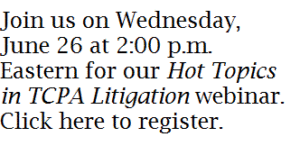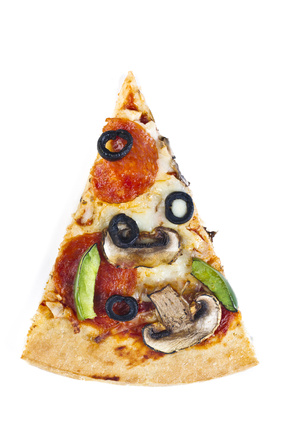Yesterday, Lawyers.com reported that Papa John’s, the national pizza chain, had reached an agreement to settle for $16.5 million a Telephone Consumer Protection Act class-action claim. If approved by the court, the settlement will put an end to an interesting lawsuit involving the TCPA’s prior express consent requirements.
 The TCPA proscribes the use of an “Automatic Telephone Dial System” to call a person’s cell phone, without first obtaining the called party’s “prior express consent” to receive such a call. Enacted in 1991, many courts, including the Ninth Circuit Court of Appeals, have found that the sending of text messages to cell phones using an ATDS also requires the recipient’s prior express consent to receive such messages.[ref]As a general proposition, telemarketing calls require written consent, but for informational calls, like debt collection calls, it can be verbal. Here, the case did not address whether the web page registration was a writing. The decision suggests, though, that the text messages were telemarketing. [/ref] We’ve been following this litigation closely because of the issues it raises concerning the manner in which prior express consent might be demonstrated (or not) under the TCPA.
The TCPA proscribes the use of an “Automatic Telephone Dial System” to call a person’s cell phone, without first obtaining the called party’s “prior express consent” to receive such a call. Enacted in 1991, many courts, including the Ninth Circuit Court of Appeals, have found that the sending of text messages to cell phones using an ATDS also requires the recipient’s prior express consent to receive such messages.[ref]As a general proposition, telemarketing calls require written consent, but for informational calls, like debt collection calls, it can be verbal. Here, the case did not address whether the web page registration was a writing. The decision suggests, though, that the text messages were telemarketing. [/ref] We’ve been following this litigation closely because of the issues it raises concerning the manner in which prior express consent might be demonstrated (or not) under the TCPA.
The Papa John’s website contained a registration form allowing a consumer to enter her cell phone number. The form also contained a check-box which asked for the registrant’s consent to send text messages to her cell phone. The sauce began to thicken when the Plaintiff here registered and provided her cell phone number, but did not check the check-box. Papa John’s subsequently sent text messages to her cell phone. Plaintiff sued, claiming the text messages were sent to her cell phone (presumably through the means of an “automatic telephone dialing system”), without first obtaining her consent to receive such messages.
Papa John’s sought summary judgment dismissing the claim, arguing that because the Plaintiff provided her cell phone number as part of the registration, she gave her permission to be contacted at that number. In May, the court denied the request, writing that since the Plaintiff did not mark the check-box, it remained a disputed material fact whether the failure to elect to receive the promotional texts was “an instruction to the contrary” — that is, by not checking the box, had Plaintiff advised she was not agreeing to receive promotional text messages? In a footnote to its decision, the court suggested that the registration form reasonably suggested to the general public that by not marking the check-box, you were not agreeing to receive text messages on your cell phone.
Papa John’s is one of several decisions this year addressing the content of “prior express consent” under the TCPA. The decision and the subsequent settlement underscore the need to carefully consider the content of forms seeking to obtain “prior express consent” under the TCPA.


